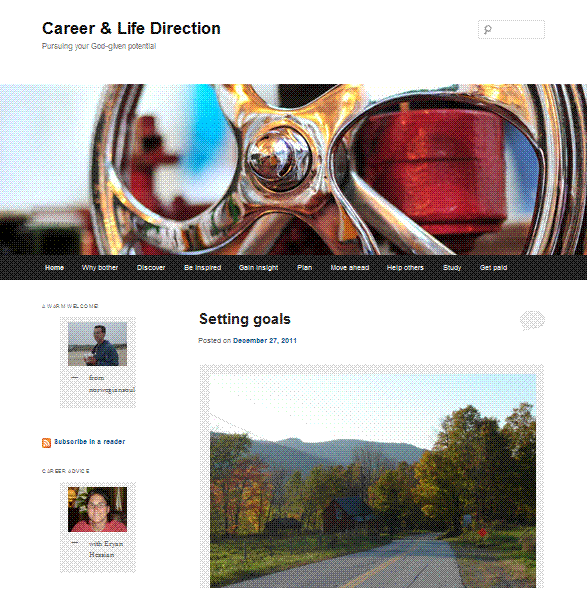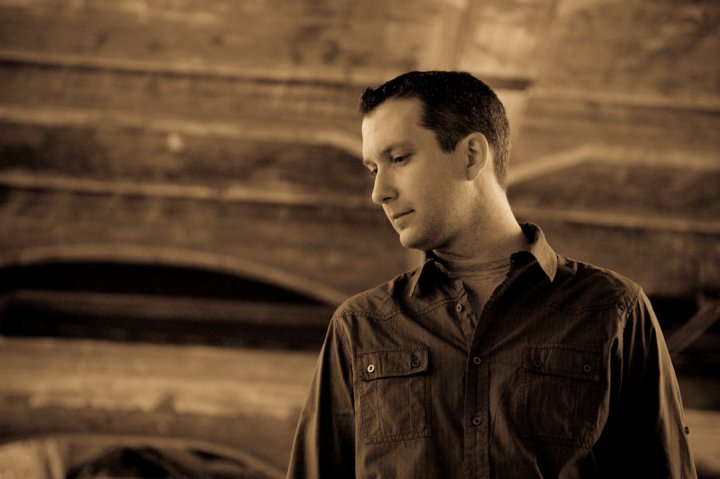Look closely before you leap
- At January 06, 2015
- By Nathan
- In Career & Life Planning
 0
0
The old adage “Look before you leap” wasn’t coined so cats could get from a comfortable chair to an even more comfortable couch. Anyone who has a cat as a pet knows that these curious – and often crazy – creatures are generally pretty good at finding their way around. Cats just intuitively seem to know what to do and don’t need a lot of instruction.
That being said, the cat in this picture once jumped off a balcony about 10 feet off the ground by accident in an impulsive attempt to catch a passing butterfly. But thankfully, she only tried that once. I guess even cats sometimes need to learn this basic lesson.
But for some of God’s other creatures (i.e. people) life experience is much more complex. Yes, we arrive on the earth with many important capabilities and yet also arrive lacking knowledge in many ways. In order to avoid any confusion, the point of this post is that it will often be necessary for each one of us to aggressively go out and get the knowledge and experience we need.
Please don’t underestimate the amount of time and intentional effort this will take. And please don’t wait too long to get started.
Back in high school, I remember boarding a bus in a bit of a haze with many other students and travelling to the University of Saskatchewan on a career exploration tour. This was a step in the right direction, in terms of gathering more information, but it wasn’t very helpful because the purpose of the trip wasn’t individually specific enough.
Oh yes, some new knowledge was acquired along the way.
What I remember most about that trip was that the agronomy or “Agro” students had a rivalry (sometimes friendly and sometimes not) with the engineers. Not surprisingly, the engineers had the technological upper hand; they had a device capable of firing melon-sized projectiles at unsuspecting agronomy students. But, not to be outdone, the Agros had the tactical advantage of a classroom on the third floor overlooking an important walking path…and access to a water hose.
Which side of the campus war did I want to be on? That was the bizarre question that captured my imagination on the trip back to my home town.
But what is really bizarre, is that I never got around to actually talking to any recent agronomy students or engineering students who had jobs doing what they were trained to do. If I was seriously thinking about becoming an Engineer don’t you think it would make sense to make an effort to talk to one and ask a few questions?
But I never did. Instead, I applied to the College of Engineering (partly because I didn’t know what else to do), got accepted and then privately agonized over whether or not I should go. Looking back, I didn’t make nearly enough effort to get the information I really needed in order to make a wise decision.
Confusion set in for good reason. I didn’t know what I wanted to do partly because I didn’t take the time or put in the right kind of effort to find out.
In case you are wondering, I never did become an Engineer. And for this the world can be eternally thankful. Enough things fall apart as it is. But being a slow learner, I went on to apply to the College of Education without ever talking to anyone who worked as a primary or secondary teacher. What was I thinking!?
Back then, my general approach was to collect as many college catalogues as possible, stare at them in a prolonged and confused state until I ran out of time, and then make a wild leap in a mostly random career direction.
Never again.
© Career & Life Direction 2015. All rights reserved.
Searching for answers
- At April 06, 2013
- By Nathan
- In Career & Life Planning
 0
0
No one arrives on this planet knowing everything they need to know. Then again, one exception comes to mind; one solitary life stands out.
But for most of us, humility always make sense. For there is so much that we do not know.
If knowledge equals power then people like you and me are obviously lacking in both. It’s a no brainer. It is so obvious. We all need help. Human knowledge is as limited as the day is long.
Trying to make a major decision? Keep in mind that you likely do not intuitively know what you need to know in order to do that. No offense. Don’t be insulted. That’s just the way it is for each person reading this. You will need to spend a significant amount of time gathering information. If you haven’t done that yet, you will need to. Sorry, but there is no other reasonable way to go about it.
Do you really want to routinely make critical decisions in a way that is random or reckless?
Even if you tend to rely more on your emotions when making a decision (and to some extent that is okay) make sure you make the time to take in accurate images and pictures which will in turn shape and inform your feelings.
This friendly word of advice is offered while taking a break from a very extensive information gathering process. This process has gone on for several years now and, frankly, I am getting tired. But there is no other option – none that I can see anyway. Either you wait for the appropriate information to come to you, or you need to make the effort to go out and find it. And usually a bit of both takes place during any significant research project.
It is encouraging every now and then when timely information drifts in your direction. But finding information and sorting through information usually takes a lot of hard work. There is no way around it.
So what do you need to know right now? Identify the information you need, and then be prepared to exert a large amount of energy to find it. Roll up your sleeves. Get ready for a workout. Don’t underestimate the amount of time it will take. Don’t expect someone else to do it for you. Grit your teeth, as they say, and then get at it.
Let’s say that you need to make a major career decision. Well then, be sure to carefully consider what you are thinking about doing before launching out decisively in that particular direction. A lack of quality research now could be very costly down the road. Now is the time to get started. Now is the time to do your homework. And yes, I speak unfortunately from experience.
Lots of enthusiasm and a lack of knowledge is a bad combination. Little enthusiasm and a lack of knowledge might be even worse. But the ideal, of course, it to be well-informed and enthusiastic. Take the time, make the time, to become knowledgeable. Make an effort to learn as much as possible when faced with a big decision.
Did I mention that searching for answers will be time-consuming and difficult?
Life isn’t easy down here on the earth. Are there any inhabitable planets where daily life might be easier? Perhaps you have pondered this question looking up into the night sky after a very long day. Maybe someone has an answer. But as far as I can tell, we could be living on this one for quite some time.
Might as well make the best of it, I guess.
© Career & Life Direction 2013. All rights reserved.
Rip-roaring resolutions
- At December 31, 2012
- By Nathan
- In Career & Life Planning
 0
0
Wouldn’t you know it. I couldn’t think of a thing to say – not a single thing. Nothing substantial came to mind.
I thought and waited and waited and thought and thought and waited some more. But still, no new years resolutions appeared. Nothing cute or clever; nothing simple or profound; no, nothing much at all.
Perhaps you can relate; but probably not. Your piece of paper is likely filled with all sorts of great ideas.
In any case, much like the song about the Grinch who stole Christmas, there are three words to describe the result of my recent reflection, and I quote: “Zero! Zip! Zilch!” Yeah, that’s about it. A few rough ideas casually crossed my mind, of course, but nothing worth mentioning or putting into print.
So be it henceforth resolved that I will not be doing much, much at all, in the new year. Or so it seems. What else is there to say? Since no lovely list will likely be forthcoming or magically appear any time soon. What more can be said? Looks like 2013 is shaping up to be a dull and uneventful year, and it hasn’t even started.
Hope you don’t mind if I take a brief break right about now to release a deep yawn. There, that feel much better. All of this talk about a lack of resolutionary talk is making me tired; that, and it is getting late.
By the way, how are your plans and resolutions shaping up for the new year? And do you feel like you are making any progress?
Resolve flows most freely from deep conviction
And while we are at it, what is the purpose of the new years resolution tradition anyway? Is there one? What is the point of writing down a bunch of overly ambitious goals that more often than not won’t be accomplished?
As you can see, this cheery train of thought, this type of ongoing inner reflection, makes for being the life of almost every party. Why join in the Boot Scootin’ Boogie (or whatever PSY has going on) when you can hang out at the punch bowl and reflect on the deeper meaning of life for hours on end? Fun, fun. And why bother catching up with an old friend over coffee when the whole story swapping scene has been called into question? Exactly.
Yep, to make things even worse, my natural tendency is to constantly question why people even talk. It’s true. Anyone still reading this post must think I am crazy or foolish or both. So be it. To be sure, this type of thinking does have a way of putting a damper on lengthy conversations. If it is any consolation, writing makes a little more sense – but not much. For either way, the weirdness that is apparent in a world that didn’t have to exist but nevertheless does is almost too much for me to manage.
Please pause for a moment and consider that each weird and wonderful person on this planet has something to offer, and that each personality type has a role to play.
For being wired in such an unusual way is not without some benefit. From my vantage point it is possible to clearly see that being alive is not normal or necessary. This tendency to be confused by daily conversation has the same effect as reading stories about talking animals or taking a trip to the moon; if you haven’t been to the moon lately imagine another strange place.
When you return to your ordinary reality, as you know, that same old situation doesn’t look quite the same. Culture shock or in this case “conversation shock” sets in. Suddenly you notice that animals don’t talk, that people frequently do, and that it could have been the other way around.
What’s the point? Is there a point?
Well, maybe, just maybe, my inability to produce a list of snappy resolutions for the new year makes sense. As an aside, one obvious reason is that I neglected to ask my wise and witty wife for her suggestions. A recent thirty-second conversation produced half a dozen goals for 2013 that would be sure to serve me well. But that is another story.
My mental roadblock, when it comes to making new year’s resolutions (and probably keeping the too), seems to come down to this: Resolve flows more freely from deep conviction than from arbitrary initiative. So meditating on the former rather than the latter is the place to begin. That was my mistake. In other words, it is necessary to reflect on what is true before deciding what to do. And remember, asking questions is necessary to get answers.
For example, a strong determination to lose weight or gain weight or move a bit of weight from here to there depends on what you are convinced is true. Your health and sense of well-being is important, but is it really true that the shape of your body is the most important thing about you? I don’t think so. Do you?
Probing deeper, are you convinced that your life is valuable whether anybody seems to think it is or not? Why or why not? Something to think about in the new year.
If you begin with the really big questions, the smaller resolutions have a way of more easily falling into place.
© Career & Life Direction 2012. All rights reserved.
Stepping stones
- At December 15, 2012
- By Nathan
- In Career & Life Planning
 0
0
Saving money is always a good idea. If you don’t know what else to do, if you are unsure which life direction to take, find your way to the nearest bank and open a savings account.
Don’t trust the banks? Start your own under the floor boards. Stash some cash in an old coffee can. Park a few pennies in a piggy bank. Then, wait until you are in a position to strategically focus your spending. Save until you can see your way ahead.
Does that sound like a good idea? If you are lacking vision right now, how about investing in a “Life Launch” fund in the meantime? The cash will be sure to come in handy someday.
Money isn’t everything but it makes a difference
Being broke isn’t exactly the best way to start out in life or to finish off your journey either. Lacking financial resources is a liability: It won’t help or improve your situation. It will hold you back and block your way.
But the problem is that saving money is admittedly easy to recommend and often very difficult to do. Spending money is usually no problem at all. Making the money and saving the money – that’s the problem. For saving lacks the immediate excitement and instant gratification connected to spending. And even if you really want to set some money aside it can be a challenge.
If the economic situation is bleak where you happen to live, saving anything substantial may seem impossible. But what is the alternative in terms of financial goals? More credit? More debt?
Learning to live beyond your means early on in life won’t lead to a growing sense of peace and satisfaction and accomplishment as the years go by. It will lead rather to frustration and discontent. Acquiring a few shiny things might impress a few people and improve your social standing for a few brief moments. But that is about it. Having adventures is all fine and good, but somebody has to pay the bills.
By way of contrast, learning how to use money wisely is part of what is involved in growing up. Learning how to live within your means and provide for your own needs is part of the maturing process.
So take the time to reflect on your financial goals. Think about your future. Try to picture where you will be in 10 or 20 years if your earning potential and spending habits do not change. Avoid anxiety but face reality.
And if this encouragement to save sounds “unspiritual” and contrary to a life that is focused on trusting in God, consider that God often provides through people who have extra cash on hand partly because of good money management. That is how it works. Entertaining the illusion that humanity can get on quite nicely without God is a huge mistake. But still, each person and organization is responsible to do what they can with what they have.
Money isn’t everything but it makes a difference.
If you want to cross a stream, if you hope to reach the other side, it will be necessary to find a few solid and well-placed stones.
© Career & Life Direction 2012. All rights reserved.
Your clearness committee
- At November 24, 2012
- By Nathan
- In Career & Life Planning
 0
0
Major decisions can have far-reaching consequences. Making a wise decision that is a fit with who you are as a person can be a challenge. One way to improve the chances of personal success is to organize your own clearness committee before spontaneously launching out in a new direction.
It isn’t a good idea to get into the habit of making large decisions all alone.
Clearness committees have been around now for over 300 years. Although this term can be traced back to the Quakers, many other groups of Christians emphasis the importance of seeking wise counsel. And for that matter, this concept comes across to many people as simply common sense. But the problem is that it isn’t always immediately obvious to young people, etc. how to invite the input of others.
Organizing a clearness committee is one way to go about gaining insight when you are faced with a significant life decision.
The use of language changes over the years. Words can become emotionally charged in a negative way. For any number of reasons, committees have developed a bad reputation. Most people would rather not go there. When you hear “committee” your knee-jerk reaction may be to quickly get away.
For one thing, committee meetings usually take place in the evening when you are already tired after a busy day. It can feel like one more event to squeeze into an already hectic schedule; another item on your agenda that you would be happy to avoid. Then, these group meetings often lack the structure and focus that is required in order to make the time spent positive and productive.
Committee meetings have been known to go on and on and on into the night accomplishing very little by the break of day. Exhausted and frustrated, you finally make your way home in a bad mood.
And let’s face it: Any time when you get a diverse group of people in one small room for a long period of time it isn’t always a good thing. Some tend to take over. Others refuse to engage in the discussion. Soon small details take up large amounts of time. There is one diversion after another. Rabbit trails multiply. Personalities clash. Before long, the conversation takes a wrong turn – the debate gets nasty and personal. People pick sides and exchange words, etc.
Who would want to be a part of that?
The strength of a committee, however, is that a wide variety of insights and perspectives are available to address the problem at hand. Insight and perspective: that is what you need right now in order to make a wise decision that will impact your future in a positive way.
How does a clearness committee work?
First of all, you need to sit down and take some time to write down what you are thinking about doing and why. Go into as much detail as you can. Let’s say you are considering moving to Madagascar to teach Canadian tourists how to commune with large sharks out in the open ocean. Try to answer the who, when, where, why, and how questions. Maybe you could start by making a note of how fast you can swim and how much life insurance you have. Go from there.
Next, call up 5 or 6 people you know and trust and ask them to meet with you for 2-3 hours. Be clear that you are not asking them to give you advice or tell you what to do. The idea is to have others ask you questions and possibly make observations in order to clarify what you think you should do. Set a date and then send your friends what you have written a few days in advance so they have time to think about your situation.
When you meet, ask someone to lead your clearness committee and enforce the observation-and-question-only rule. Ask someone else to take brief notes of what is said during your time together. This will provide the basic structure and allow you to reflect on the insights that were offered later on.
Be prepared for awkward moments of silence. It is okay to not always have the air filled with words. But, at the same time, be prepared to benefit from the many thoughtful questions and observations your friends will offer.
This brief discussion isn’t intended as an endorsement of everything any particular Quaker person or group may believe. Nor is this to be taken to suggest that a quest for “inner truth” sums up the whole decision-making process. But this is one way you can begin to move beyond an excessively individualistic way of life and hopefully make better decisions.
By way of full disclosure, I have never organized or been a part of a clearness committee. But I wish I had. Looking back, this type of encouragement and support would surely have been beneficial early on.
So think about your future. Take the initiative. Do what you need to do in order to make wise decisions today.
© Career & Life Direction 2012. All rights reserved.
The planning book
- At August 20, 2012
- By Nathan
- In Career & Life Planning
 0
0
Bought a thin black book the other day and labelled it “The planning book.” Such an exciting day it was, buying that book. Epic, indeed. Ranked right up there with other major world events (i.e. elections, economic problems, etc.). Should have been there to take it all in. It was quite something.
One newspaper headline captured the moment with this gripping title: “Man buys book at Walmart.” That about said it all. Such an exciting moment in world history. Truly amazing. An absolutely thrilling event to be sure that was now securely entrenched in our collective memory. Captivating. Compelling. How else could it be described? Children will be told this story for generations to come.
Yes, this book-buying expedition was really quite something.
People stopped talking and turned to stare as I marched towards that checkout line. It was awkward, to say the least. The silence was loud. Complete strangers reached out to shake my hand and pat me on the back as I passed by. More than a few people said it, loudly: “Bon chance mon ami!” And when I walked up to the counter and slapped that VISA card down, there was a spontaneous and enthusiastic round of applause. It went on and on.
Throughout the store, everyone was on their feet cheering wildly for a good ten minutes. It was like being at a big NFL football game. It was like the NHL playoffs or the NBA; like the closing ceremonies at the Olympics games in London. For I moment, I expected a classic British rock band to emerge from under the floor on a hydraulic stage. U2 would have been nice. Thankfully, the Spice Girls didn’t show up.
But then, when the fireworks started going off inside, thought it might be about time to take my brand new book and get out – and quickly head for the door. But I didn’t get far.
A dozen or so camera crews were crowded together outside blocking the way. Bright lights, microphones, jostling journalists, questions and more questions; it was quite a commotion. CNN, NBC, ABC, FOX, CBC, CTV, Global, etc…they all showed up to cover this incredible story and hit it from every possible angle. The colour of the book. The cost of the book. The size of the book. The reason for buying this book now. It seemed like the questions would never end.
A BBC reporter caught my attention with a crisp and delightful British accent. Said that he flew all night to get here and barely made it for this big day. But now that I was here with my book, and he was here in Canada with his crew, it would be brilliant, just brilliant, if I could tell people all around the world how I was feeling right now – at this very moment.
He talked so fast, like all the other reporters, that I barely had time to think.
“Well, I guess it has come down to this,” I said, slowly trying to gather my thoughts. “What I mean is that – it’s time. It’s time to move ahead in my life in a more clear and directed way. And this book…well, maybe this book will help.”
“So your feeling pretty good about your purchase? And you really think that this new book is going to help you find your way and possibly your place in this world?” he said. “That sounds like a lot to expect from one little book.”
He smiled as he talked, and seemed to hint that he already knew it was going to make a big difference by his tone of voice. There was a sense of anticipation hanging on each word he said.
“No, this book isn’t going to change everything,” I said, considering the unusually positive atmosphere around me. “But it is the planning-type people who tend to change the world.”
Driving home, the whole experience played over and over again in my mind. It was a day I will not soon forget.
And there it sits, even now: My new planning book
© Career & Life Direction 2012. All rights reserved.
Dream big. Act small.
- At December 31, 2011
- By Nathan
- In Leadership
 0
0
Having a sense of direction, knowing the next small step in the larger plan, can be very beneficial to individuals and organizations. This way, important projects can be more easily identified and accomplished in a specific period of time.
I once applied to work for a Christian-based organization in Canada that had a related problem. Numerous leadership teams had produced impressive mission-statements, but very little was ever accomplished. Or so I was told.
The plan may have looked good on paper, as they (whoever “they” are) say, and these men and women may have even had the best of intentions. But, for whatever reason, they struggled to practically guide a group of people towards a specific destination. They appeared to know where they wanted to go, but just couldn’t seem to get there.
That is sad, even tragic, because as this story repeats itself over and over around the world it means that millions of people are likely failing to fulfill their full God-given potential.
Organizations and individuals can become stuck, and this post is one small attempt to help you or your organization get out of the muck, as it were, and finally move ahead. But please, if you sense that this describes your situation, spend as little time and energy as you can in a state of mournful self-condemnation. No, you are not a complete failure, or a sorry excuse for a human being. Turn those messages off. Stop. Think. Learn. Adjust. And then, move ahead.
If you are looking for an easy way to remember the point of this discussion may I suggest the following four small words:
Dream big. Act small.
Complicated, varied, and shall be we say “highfalutin” management-type lingo can be part of the problem. I am not sure if I could tell you the difference between a vision-statement and a mission-statement, a strategy and an objective, a stage or a phase, if my life depended on it. I have been in boardrooms and participated in futile attempt to separate and define these various words. It is like nailing jello to a wall, as the infamous “they” people say.
Begin, rather, with the simple image of a funnel. Whatever language you choose to use, start big – at the wide end of the funnel – and slowly work your way down to the specific and small actions that can be taken. How big? I have read a lot of job descriptions, hundreds of them, produced by reputable organizations in many parts of the world. To be honest, it sometimes sounds like these groups are mainly concerned about their own survival. May I say, straightaway, that organizational or personal survival is not a large enough goal, or an appropriate place to begin. Yes, paying the bills is important. But you don’t exist primarily to pay bills.
What happens next, is often where more confusion takes place. For if the big beginning is big enough, it will feel overwhelming and nobody will know what to do next. Almost a century ago, Henry Ford decided that he wanted to build a car that ordinary Americans could afford. Where do you start? You start by putting a plan together that, if followed, will at least potentially transform the “big dream” into practical reality.
But there is so much that I cannot control, you say. True enough. And there always will be. In case you are wondering, I am not suggesting that planning is somehow a substitute for prayer or that it will guarantee success. But, at the same time, there is very often something small and tangible that you or your organization could be doing that you are just not in a position to see right now. Taking the time to put together a detailed and practical plan can help you perceive the possibilities.
If you do not have a grand vision or goal or dream, start with that. If you do not have a credible plan, take the time to produce one. If you are not intentionally following your plan, start today.
Dream big. Act small.
Might make a good resolution for the new year.
*Here are a few related discussion questions
© Career & Life Direction 2011. All rights reserved.







































